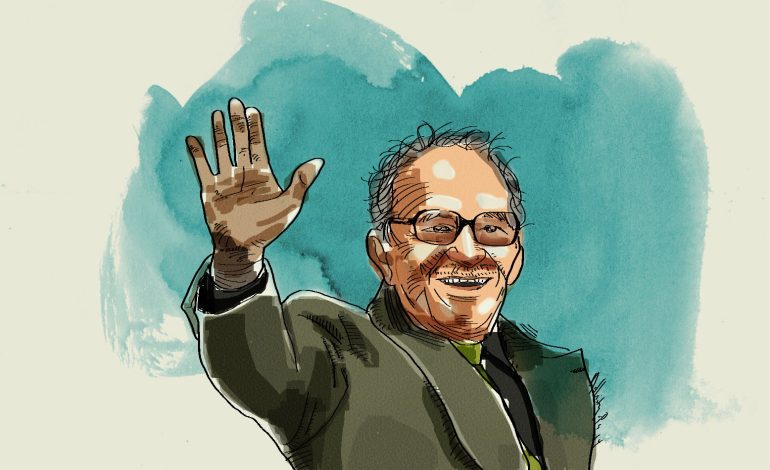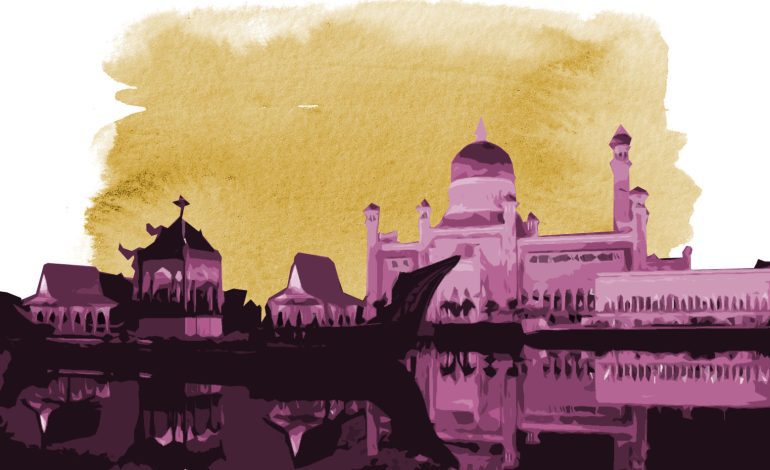For Nobody Can Take Away the Dances We’ve Already Had

*This piece was written during the rainy morning of Saturday the 19th
I woke up yesterday morning, on what was technically a Good Friday in Jakarta, to learn that Gabriel Garcia Marquez had passed away. Mi maestro mas magical…muerto.
Shouldn’t have been surprising, as 1.5 years ago his family already issued a statement of his deteriorating health so as to “…likely never write again.” He had defeated lymphatic cancer years before, so it was hard to imagine that he might’ve been battling some degenerative illness, dementia or Alzheimer, that cruelly ravaged his writing capability. When Bill Clinton tweeted a picture of them spending an afternoon last May and talking about life and literature, I’ve got my hopes up. When news broke on April 6th that he’d been rushed to hospital for lung problems, I cheered on the fact that he was discharged soon after. Gabo would survive this bout too, I said like a litany.
So yesterday it felt like a ton of brick came crashing onto me, gushing out this bloodless pain and bottomless sorrow I didn’t know how to patch. I curled in bed and silently wept.
In summer 1995 I discovered the English version of One Hundred Years of Solitude, his 1967 masterpiece that revered critic William Kennedy called “the first piece of literature since the Book of Genesis that should be a required reading for the entire human race” and that has since been translated to over 30 languages. With my then English proficiency it took almost two years to finish it, and I fell in love with him and his colorful Latin America carnival along the way. I wanted to be able to read his works in the original language they were written, so I inquired the Spanish Embassy for a Spanish tutor, which was very rare back then in Indonesia. I was directed to an Indian woman (yes, surprise!) on the other side of the city. The lessons unfortunately had to stop when I started working full-time after college.
Yet two years later, enrolling in a unique American business school that required students to be bilingual and choose a world region of interest, I didn’t bat an eye – Spanish, and Latin America. I spent a Winterim trimester in Chile and Peru, and was enrolled for another Winterim in Cuba before pulling out at the last minute due to job interviews. Upon graduation my job with an American multinational took me to Florida, Manila, and – had it not been for that unfortunate IMF debt default saga – possibly Buenos Aires.
Some writers’ words haunt you for life. Gabo’s ethereal words, very literally, opened a new world and shaped a cherished part of my life.
He was awarded a Nobel for Literature in 1982, his books have outsold anything in Spanish but the Bible, and even peers like Chilean poet Pablo Neruda put him on par with 17th century writer Miguel de Cervantes, yet he never hogged the spotlight (often, cheekily showing his middle finger while photographed).
He attended discussions on various humanity subjects and wrote eloquently in NYT during the Elián Gonzáles case in 2000, but he didn’t grant many interviews. He penned the powerful Love in the Time of Cholera, wrote about a beguiling beauty on a plane ride that could be either Indonesian or Andean, quipped insightfully about modern relationships, all the while staying married to the same sweetheart for almost 60 years. Not that he was ever short of women throwing themselves at him, I bet you. I’ve met Latino literati who’d abandoned the Roman Catholic Church yet would earnestly perform a cross when his name came up in conversations.

I used to joke to Latino friends that I’d marry anyone who could secure me an audience with him, and teased some Mexican diplomats that there’s no benefits befriending them when they couldn’t present me to Gabo in his Mexico City home, where he mainly resided since the ‘60s.
“What would you actually do?” one asked. All I wanted was to solemnly thank him, hopefully in the best Spanish I could muster – provided that I wouldn’t suddenly forget words of any language in his presence.
Hey look, I know he wasn’t perfect. I’m aware of how most Cuban emigrants saw his friendship with Castro, how some of his Colombian country folks viewed his public standings or overseas living, or how his loyal readers were sharply divided on his last novel. But how he spellbindingly crafted words, magically played up plots, sublimely twisted the line between reality and fantasy, and wildly ventured into the raw corners of human heart and mind we’re often too fearful to touch… nobody writes like that. Nobody. Not in this lifetime. Maybe Milan Kundera, but in a far second.
News of his death broke right after Chelsea Clinton’s pregnancy, while Bill was the last public person who met and was photographed with him. He died locked in the solitude of his marvelous mind, like Col. Aureliano Buendía, and on pre-Easter Holy Thursday, just like Úrsula Iguará. Life has eerily come full circle for the 87-year-old genius that was Gabriel García Márquez.
I went about yesterday like a numb zombie with a gaping hole in my being. My coffee appointment, a self-proclaimed diehard leftist who had to read Gabo at the start of her political activism, was very surprised to find me, whom she and comrades had often dubbed unrepentant capitalist, inconsolable about Gabo’s demise. I pointed that Gabo, for all his resourceful portrayal of Latin American life that made loyal readers gradually understood why socialism organically gained roots there for better or worse, never tried to label anybody nor sell any ideology. Yet, as experiences and memories are formed very personally, to judge is simply stupid.
To her and colleagues, Gabo was part of their fight. To many other people Gabo meant absolutely nothing, and they’re probably wondering what the fuss is all about. To me, and countless strangers who suddenly reached out to one another through various social networks these days in a shared grief, Gabo taught us life.
Last night I decided I’d pay homage to wherever his remains would be entombed. Then I learned this morning that his family wanted a cremation. Éso es—I will never get to meet him, just as I never got to finish reading his works in Spanish for it was too hard. Maybe, just like the genre that’s been bestowed upon him and shadowing every other Spanish-speaking writer since, he’d ultimately embody the notion of magical realism to me. Never was, but always is.
About Lynda Ibrahim
Lynda Ibrahim is a Jakarta-based writer and consultant, with a penchant for purple, pussycats and pop culture.






















